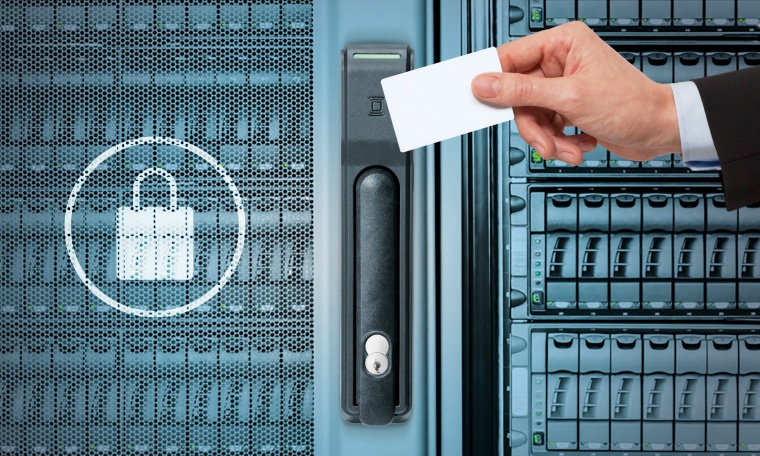Assa Abloy: Three Levels of Physical Server Security

Businesses, large and small, create data which needs protecting, whether in an onsite server room or co-located at a data centre. When imagining a corporate data breach, people often picturing black-hat hackers pursued by cybercrime investigators. The reality is often more mundane: Only around a half of breaches involve hacking, according to a recent report. To ensure maximum security of company servers, Assa Abloy recommends three levels of security working together within an integrated access system.
In the absence of appropriate physical server security, the mundane can be dangerous — and expensive. Recent research for IBM by the Ponemon Institute estimates the average total cost of a data breach at $3.86 million, or €3.57 million. According to the same benchmark report, this average is rising, by 6.4 percent in the last year alone. Some of the highest breach costs are borne by companies in Europe, including Germany, France, Italy and the UK.
Such costs can be direct: in business disruption, lost mailing lists or disabled logistics software. Or they can be indirect: an erosion of customer trust and damaged brand equity. Hard-earned goodwill and positive reputations are quickly reversed. Costs also come from fines levied by government and supranational regulators. As Big Data gets bigger, so does the regulatory landscape for data handling.
The most relevant framework for those operating in the EMEA region is the European Union’s General Data Protection Regulation, the GDPR. This wide-ranging data privacy rulebook has been enforced since May 2018. The GDPR requires to protect storage of all personal information, including customer and employee data. Safeguards must include both electronic and physical barriers to unauthorised access.
Three levels of physical security for servers
In its recent white paper, Assa Abloy recommends three levels of security working together within an integrated access system. At the top level, perimeter security ensures only authorised personnel enter a data storage building. Here, door and gate electronic locks with credential readers can work alongside the likes of CCTV and monitored fencing.
On level two is the server room access. This can be monitored and controlled with a range of access control door devices with inbuilt credential readers, including Aperio battery-powered escutcheons or complete security locks. Either device integrates seamlessly with access and security management systems from over 100 different manufacturers. At room level, physical security must also include water- and dustproofing, electromagnetic security and protection against other physical threats to servers and data.
The third, final level of physical data security is the server rack or cabinet. Server rooms have a steady flow of authorised traffic: cleaners, maintenance staff, repair technicians and others. Employee screening cannot be perfect — and accidents happen. Rack or cabinet locking with RFID readers is the last line of defence against a malicious or accidental physical data breach.
Responsive rack protection
Assa Abloy’s Aperio KS100 Server Cabinet Lock adds real-time access control and monitoring to server racks and cabinets. The lock works with an existing or new access control system; compatible credentials employ all standard RFID protocols including Iclass, Mifare and Desfire. Under the EU’s GDPR, anyone affected by a breach must be informed “without undue delay”. With the Aperio KS100, users know right away if unauthorised access had even been attempted.
Once installed, KS100 locks integrate with the exsisting access control system and communicate wirelessly via an Aperio Communications Hub, even if the racks are co-located in a distant data centre. Once online integration with the security admin system is complete, lock access decisions are communicated from and recorded by the software wirelessly.
“When Aperio replaces mechanical locking at all three levels of server access control, lost keys no longer compromise data security. Lost credentials are simply deauthorised and a valid replacement reissued," explains Johan Olsén, Aperio Product Manager at Assa Abloy Opening Solutions EMEA. "The current status of any lock, at any level, is revealed with the click of a mouse. Generating detailed audit trails is straightforward, making the KS100 and other Aperio wireless locks invaluable for incident investigation."
The right electronic locking keeps customer reputations intact, important data off the Dark Web, and managers on the right side of the multiple data protection regulations, including GDPR. Assa Abloy’s free 12-page briefing paper on data centre security can be downloaded on the company's website.















